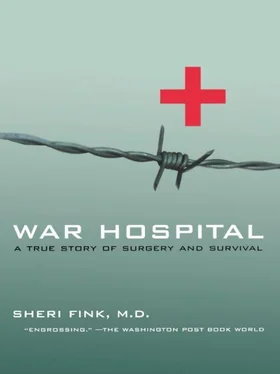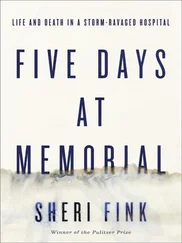Rufin, Jean-Christophe. “The Paradoxes of Armed Protection.” In François Jean, ed., Life, Death and Aid: The Médecins Sans Frontières Report on World Crisis Intervention. New York: Routledge, 1993, pp. 111–123.
Russbach, Remi, and Daniel Fink. “Humanitarian Action in Current Armed Conflicts: Opportunities and Obstacles.” Medicine and Global Survival , Vol. 1, No. 4, December 1994.
Sandoz, Yves. “‘Droit’ or ‘devoir d’ingérence’ and the right to assistance: the issues involved.” International Review of the Red Cross. May–June, No. 288, pp. 215–227, 1992.
Selimović, Meša. The Fortress (translated by E. D. Goy and Jasna Levinger). Evanston, Ill.: Northwestern University Press, 1999.
Silber, Laura, and Allan Little. Yugoslavia: Death of a Nation. New York: TV Books, Inc., 1996.
Silove, Derrick. “The Psychiatrist as a Political Leader in War: Does the Medical Profesion Have a Monitoring Role?” The Journal of Nervous and Mental Disease. Vol. 183, No. 3, March, 1995. pp. 125–126.
The Socialist Republic of Bosnia and Hercegovina: An Offprint from the Second Edition of Enciklopedija Jugoslavije. Zagreb: Jugoslavenski Leksikografski Zavod, 1983.
Treasures of Yugoslavia: An encyclopedic touring guide. Belgrade: Yugoslaviapublic, [undated].
UNHCR. The State of the World’s Refugees: In Search of Solutions . Oxford: Oxford University Press, 1995.
———. The State of the World’s Refugees: The Challenge of Protection. New York: Penguin Books, 1993.
van Laerhoven, Bob. Srebrenica: Getuigen van een massamoord. Antwerp: Icarus (Standaard Uitgeverij NV), 1996.
Vincent, Anne. “The ‘French Doctors’ Movement’ and Beyond.” Health and Human Rights. Vol. 2 No. 1. 1996. pp. 25–29.
Westmoreland, Barbara, Eduardo Benarroch, Jasper Daube, Thomas Reagan, and Burton Sandok. Medical Neurosciences: An Approach to Anatomy, Pathology, and Physiology by Systems and Levels, Third Edition. Boston: Little, Brown and Company, 1994.
Yugoslavia: Death of a Nation [Videorecording]. Brian Lapping Associates for Discovery Channel, BBC, and ORF; series producer Norma Percy; producer, Angus Macqueen; director, Paul Mitchell. New York: Discovery Channel Video, 1995.
Zajtchuk, Russ, and Christopher M. Grande (eds.). Anesthesia and Perioperative Care of the Combat Casualty. Washington, D.C.: Office of the Surgeon General, 1995.
The town Srebrenica, Photo Institute for Military History RNLA; The Srebrenica Hospital, Sheri Fink; The main road leading north , Rene Caravielhe/MSF; General Philippe Morillon, Philipp von Recklinghausen; Dr. Eric Dachy , Courtesy of Dr. Eric Dachy; In the pharmacy , Courtesy of Dr. Thierry Pontus; First attempted helicopter medical evacuation , Philipp von Recklinghausen; A young child mortally injured, Philipp von Recklinghausen; In the Srebrenica Hospital “emergency room,” Philipp von Recklinghausen; Srebrenica was flooded with displaced villagers , Philipp von Recklinghausen; Srebrenica’s amputees march through town, Philipp von Recklinghausen; Local soldiers shoot into the air , Philipp von Recklinghausen; Injured patients lie on the floor, Hans Ulens; Dr. Nedret Mujkanović, Suzanne Keating; Because of a severe paper shortage, doctors wrote prescriptions, Samples collected by Sheri Fink; In the Srebrenica Hospital operating theater, Laurence de Barros-Duchêne; MSF party with hospital staff, Courtesy of Dr. Ilijaz Pilav; The “Ljiljanijade” sports competition, Courtesy of Dr. Ilijaz Pilav; Bosnian Serb army physician Boro Lazić, Courtesy of Dr. Boro Lazić.
This book owes its greatest debt to two physicians—Dr. Ilijaz Pilav and Dr. Eric Dachy—without whose stories and extensive cooperation it would not exist. I will never underestimate how difficult it was for all of those I interviewed to recall the most trying days of their lives. Dr. Boro Lazić, Dr. Nedret Mujkanović, Dr. Fatima Dautbašić, Dr. Ejub Alić, and nurses Ajka Avdić and Christina Schmitz also bore with me for dozens of hours. Thank you from the bottom of my heart for your openness and for learning to laugh knowingly every time I said, “Just one more question.” In addition, I would like to extend my gratitude to all others whose names are listed in the chapter sections under interviews.
Thank you to the very many people who provided information, materials, encouragement, and other forms of support during the research and writing of this book. The most special thanks are due to two of the finest and most brilliant journalists I know, and to whom my work owes its greatest debt. Chuck Sudetic, the gifted author of Blood and Vengeance , was immensely generous and encouraging throughout this project. (And thanks to his parents, Kris and Al, for letting me rummage through their attic!) David Rohde, author of Endgame: The Betrayal and Fall of Srebrenica, was always supportive, and the sterling example he sets of journalistic integrity, hard work, and guts is one of my greatest inspirations. I’d also like to thank Dr. Sead Ahmetagić, Mubina Alić, Dr. Sabit Begić, Mayor Selim Bešlagić, Tony Birtley, Sonja Biserko, Urs Boegli, Norbert Both, Rony Brauman, Dr. Smail Čekić, Richard Claude, Dr. Louisa Chan-Boegli, Muriel Cornelis, Dr. Georges Dallemagne, Laurence de Barros-Duchêne, Dr. Martin De Smet, Alain Destexhe, Rex Dudley, Dr. Neak Duong, Muhamed Duraković, Dr. Dževad Džananović, Hadžo and Mensur Gadžo, Dr. Besim Hajdarović, Dr. Mehdin Hadžiselimović, Dr. Avdo Hasanović, Guy Hermet, Glenn Hodgson, Samira Hodžic, Larry Hollingworth, Dr. Ibrahim Huskić, Nedim Jaganjac, Kris Janowski, Laurens Jolles, U.S. Army Captain Omar Jones, Dr. Gerry Kremer, Dr. Benjamin Kulovac, Judith Kumin, Dr. Petar Lončarević, Sanja Lazić, Asim Lučanin, Dr. Jean-Pierre Luxen, Hakija Meholjić, Dr. Milomir Milošević, and the current staff of the Srebrenica and Bratunac Health Centers, Hasan Nuhanović, Azra Mujkanović, Bart Nijples, Daniel O’Brien, Isabel Ollieuz, Fahreta Omić, Dr. Miroslav Oprić, Dr. Irfanka Pašagić, Senad Pečanin, Dr. Radomir Pavlović, Ibrahim Purković, Dr. Božina Radević, David Rieff, Dr. Adi Rifatbegović, Gen. Hazim šadić, Pierre Salignon, Naim Salkić, Nijaz Salkić, Dr. Mirha Saračević, Emira Selimović, Rahima and Damir Tursunović-Ibrahimović, the Ustić family, Gerard van Driessche, Philipp von Recklinghausen, Dr. Piet Willems, and Dr. Wim Wertheim.
This would have been a far less informed book if not for the remarkable openness of the Doctors Without Borders organization. Its leaders’ inclination to look critically at their own work and allow others to do the same is the key, I believe, to the organization’s impressive history of growth and vitality. I have the utmost respect for the group and its members, who approach their work with a rare sense of purpose, integrity, creativity, and intellectual curiosity. For their help in locating archival materials and connecting with former aid workers, thanks to the many staff members of Doctors Without Borders Belgium; to Cecile Guthmann, Anne Fouchard, and others at Doctors Without Borders France; and to the brave and compassionate Kenny Gluck, Malou Nozeman, and others at Doctors Without Borders the Netherlands.
The following institutions and their former and current representatives also provided a valuable font of materials: Anne Harringer, Pippa Scott, Svjetlana Tevapčić and the International Monitor Institute; Ger Duijzings, Paul Koedijk, Peter Romijn, Dijk Schoonoord, and the Netherlands Institute for War Documentation; Sead and Nihad Kreševljakovića and the Hamdija Kreševljakovića library in Sarajevo; šefket Ibrišević and the Archives of the Bosnian Army Second Corps in Tuzla; the New York and Boston Public Libraries; New York University Library and U.N. repository; libraries of the University of California at Berkeley, Harvard University, Stanford University, Hoover Institution, and University of Michigan; Narodna Biblioteka Bratunac; Ministry of Public Health Tuzla; University of Sarajevo Medical School; Bosnia-Herzegovina Institute of Public Health in Sarajevo; Federal Hydrometeorological Institute of Yugoslavia, Belgrade; Kris Janowski, Trudy Huskamp Peterson and the archives of the United Nations High Commissioner for Refugees; Dr.
Читать дальше












